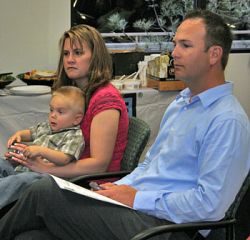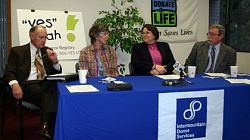Religious leaders share views on organ donation

SALT LAKE CITY — "There are so many myths and misconceptions surrounding organ and tissue donations that we have named April ‘National Donate Life Month,’" said Alex McDonald, public education director for Intermountain Donor Services (IDS). "Many people are concerned because they mistakenly believe organ donation violates their religious beliefs," said McDonald. "We encourage people to talk to their religious leaders about donation." IDS sponsored a media event at their office April 17, in which four religious leaders explained their particular religious views and addressed those misconceptions. "The Catholic church views organ donation in a favorable light," said Deacon Scott Dodge of the Cathedral of the Madeleine, who serves as a chaplain at LDS Hospital. "According to the Catechism of the Catholic Church, ‘Organ donation is a noble and meritorious act and is to be encouraged as an expression of generous solidarity’ (2296). "Through organ donation, we foster life," said Dodge. "For it to be morally acceptable, the organ donor must personally give explicit consent by signing up as a donor. Individuals are encouraged to express their consent to family members before their death, because in the end the family of the deceased must also consent to organ and tissue donations." Addressing participants in the First International Congress of The Society for Organ Sharing, June 20, 1991, Pope John Paul II commented, "In effect, transplantation presupposes a prior, explicit, free and conscious decision on the part of the donor or of someone who legitimately represents the donor. In this sense, the medical action of transplantation makes possible the donor’s act of self-giving, that sincere gift of self which expresses our constitutive calling to love and communion." Scott Parker, who represents the LDS Church on the Salt Lake Interfaith Roundtable, said the decision is a personal one made by the individual or the deceased member’s family. Elaine Emmi, chairwoman of the Salt Lake Interfaith Roundtable said organ donation is something we should consider so when a death occurs, we will be ready to act. "As a Quaker, we do not have set doctrine, we leave the decision up to the individual," said Emmi. "I have a medical condition, so I am certain no one would want my organs, but I plan to donate my body to science for research through the University of Utah." "In Jewish tradition, there is great sanctity placed on the care of the body after someone is deceased," said Rabbi Tracee Rosen of Congregation Kol Ami. "We do not believe in cremation or open casket viewing, we believe in a process of ritual cleansing of the body, and it is something sacred that all parts should be buried. "So from that long-standing tradition, a lot of people have the misconception that Judaism would see organ donation as some kind of mutilation of the deceased," said Rosen. "Jewish tradition is clear across all the major denominations that the opportunity to use tissues or organs in order to save somebody’s life or enhance their quality of life is, in fact, encouraged. Organ donation does not affect proper burial of the rest of the body." Russell Baker, pastor of the United Church of Christ in Bountiful, said his denomination strongly encourages donation, but the decision is left up to each individual. "I have indicated on my driver’s licence that I want to be a donor," said Baker. "It is very clear to my family I want to continue an act of grace even in my death, and I can do that through organ donation." According to IDS, 20 people die each day waiting for a life-saving organ transplant, amounting to 8,000 unnecessary deaths each year. More than 80,000 people are waiting for a life-saving transplant, and one donor can save up to nine lives through organ donation, and enhance the lives of 50 people through tissue donation.
© Copyright 2024 The Diocese of Salt Lake City. All rights reserved.


Stay Connected With Us